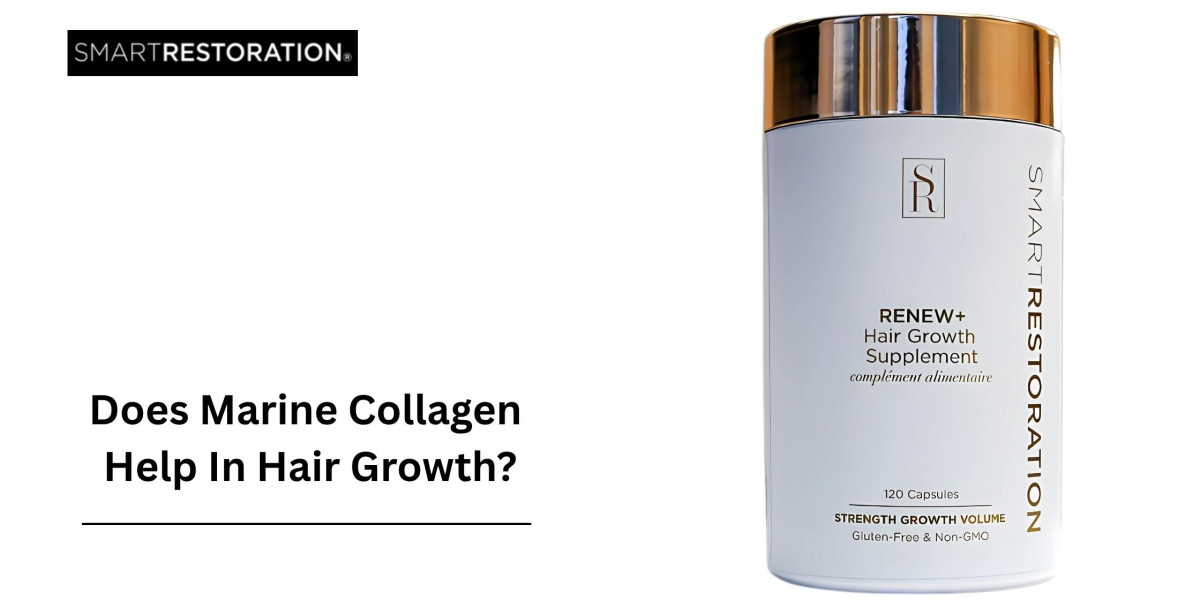Collagen has become a go-to ingredient in the wellness world, known for supporting glowing skin, joint flexibility, and stronger nails. But recently, many people have started asking: Is marine collagen good for hair? With hair thinning and breakage becoming common concerns due to stress, diet, and environmental damage, it's no surprise that collagen—especially marine collagen—is making headlines as a hair care hero. But what exactly is marine collagen, and how does it support hair growth?
Let's explore the benefits, science, and comparisons behind marine collagen to see if it truly lives up to the hype.
What Is Marine Collagen?
Marine collagen is a type of collagen derived from the skin, scales, or bones of fish, usually wild-caught or sustainably sourced. Unlike bovine (cow) or porcine (pig) collagen, marine collagen is typically rich in Type I collagen, which is the most abundant form found in the human body. Type I collagen plays a major role in the health of skin, bones, and connective tissue, especially the structure of hair follicles.
What makes marine collagen particularly appealing is its bioavailability. Thanks to its smaller particle size, marine collagen peptides are absorbed more efficiently by the body, making them highly effective when taken as a daily supplement.
How Marine Collagen Supports Hair Growth
Now, back to the key question: Is marine collagen good for hair?
Here's how it contributes to healthier, fuller, and stronger hair:
1. Strengthens Hair Follicles
Hair begins its journey in the follicle, which is rooted in the dermis of the scalp. This layer is made up largely of collagen-rich tissue. By supplementing with marine collagen, you're essentially reinforcing the building blocks of these follicles, helping them stay firm and resilient over time.
2. Boosts Scalp Health
Healthy hair starts with a healthy scalp. Marine collagen helps improve skin elasticity, hydration, and tissue regeneration—important factors in maintaining a nourished, irritation-free scalp. A healthy scalp means a better environment for new hair to grow.
3. Promotes Protein Balance
Hair itself is primarily made of a protein called keratin. While marine collagen doesn't directly contain keratin, it provides amino acids like proline and glycine, which are essential for keratin production. Think of marine collagen as the fuel your body needs to produce the proteins that grow strong, shiny strands.
4. Reduces Hair Thinning
Collagen contains antioxidants that fight free radicals—unstable molecules that can damage hair follicles and speed up thinning. Over time, collagen supplementation may help protect follicles and reduce premature hair loss linked to oxidative stress.
What Does the Research Say?
Although more studies are still needed, early evidence and anecdotal reports suggest promising results.
Marine collagen has gained attention for its potential to support healthy hair growth by nourishing the scalp and reinforcing the hair structure from within. One of the ways it does this is by influencing dermal papilla cells—key players in controlling the hair growth cycle and stimulating new growth.
Research has also shown promising results. A study published in the Journal indicated that collagen peptides may help promote the regeneration of hair follicles, especially when combined with hair-friendly nutrients like biotin and vitamin C.
While the pace of improvement can vary depending on the individual, marine collagen is widely recognized for enhancing the overall condition of the scalp and hair. With regular use, it may lead to stronger strands, reduced shedding, and improved hair thickness over time.
Is Marine Collagen Better Than Other Types?
You might be wondering how marine collagen stacks up against other types like bovine or porcine collagen.
The main difference lies in Type I collagen concentration and absorption rate:
Marine collagen is primarily Type I, making it an ideal choice for promoting skin and hair health.
Bovine collagen contains both Type I and Type III, which may support joint and skin health, but with slightly slower absorption.
When the goal is to improve hair texture, reduce breakage, or encourage new growth, marine collagen often emerges as the top choice due to its rapid bioavailability and direct benefits for the skin and follicles.
When Will You See Results?
If you're consistent, most people notice visible improvements within 8 to 12 weeks of daily marine collagen use. This includes:
Stronger strands with less breakage
Improved hair texture and smoothness
Less hair fall during brushing or washing
A more nourished and less flaky scalp
However, results depend on various factors like age, diet, stress levels, and whether collagen is combined with other hair-supportive nutrients.
How to Add Marine Collagen to Your Routine
Marine collagen is typically available as:
Unflavored powder (great for smoothies or coffee)
Flavoured drink mixes
Capsules or tablets
Liquid shots
For best results, pair marine collagen with Vitamin C, which enhances your body's ability to absorb and utilise collagen efficiently.
Pro tip: Consistency is key. Marine collagen isn't a quick fix, but when taken daily, it becomes a reliable part of your long-term hair wellness plan.
Conclusion:
So, is marine collagen good for hair?Yes—marine collagen offers valuable support for scalp health, follicle strength, and protein regeneration, which are essential components of strong, vibrant hair. While it's not a miracle cure, it can be a powerful addition to your routine if you're seeking fuller, healthier strands from within.
And the best part? It's a clean, sustainable source of beauty nutrition that fits seamlessly into your wellness lifestyle.








